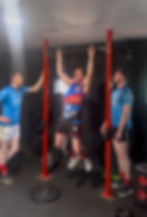How We Use Micro-Dosing Training to Build Elite Results with GAA Athletes in Less Time
- Barry McGinley
- Jun 25, 2025
- 2 min read
Club GAA has gone a bit mad in the last few years.
I’m seeing lads getting up at 7am, doing 40+ hours at work, then being expected to train 4–5 days a week with a match at the weekend, all while trying to balance family, social life, and still “enjoy” football.

How is anyone supposed to keep that up for a season, never mind a few years?
I remember when I was playing. It was old school. We trained hard 'we got dogged' was a common phrase and ment absolutely ran into the ground every night but it was usually two nights a week and three when championship came around. No one had a clue about gym work yet. We just ran (a lot), tackled, and played. There was a simplicity to it, even if it was tough.
When I came back from Dubai and was asked to take over the strength and conditioning for our local Division 1 club, I knew something had to change. Luckily, the two lads managing the team saw things the exact same way.
So we started doing things differently.
🧠 Less Is More: Our Micro-Dosing Approach
Instead of overloading players, we now focus on what matters most and we do it in less time.
💥 We micro-dose strength and rehab work before pitch sessions short, focused gym blocks.📉 This means we're not adding extra sessions or eating into recovery time.⚽ We train twice a week, and with matches that gives at least 4 days of proper recovery.
Everything is intentional:
Strength + power sessions under 45 minutes
Sprint exposures built in
Aerobic work done through smart conditioning
Rehab and prehab baked in — not bolted on

This idea of “micro-dosing” sessions - coined by guys like Cory Schlesinger (Executive Director of Performance for the NBA ) is all about exposing athletes to just enough stimulus frequently, without draining them.
📚 Research supports this too: a 2021 study in the International Journal of Sports Physiology and Performance found that short, high-frequency strength sessions (2–3x/week) led to significant gains in strength and power without adding excessive fatigue, compared to traditional longer sessions.
✅ The Outcome?
Players actually look forward to training again.They're fresher, stronger, and still have energy left for life outside of football.
Younger lads are sticking with it, not burning out by 25. We’re not chasing a badge of honour for “who trained more” we’re chasing performance, health, and a sustainable path through the season.
We’ll be ready come championship not just fit, but fresh.
Something had to change… and I’m proud we’re part of that change.
⚠️ Final Thought
Club GAA is full of hard-working, passionate lads. But we’re not pros and the approach shouldn’t be pretending we are. Smart training > more training. You can still win, still enjoy it, and still have a life.
If you’re a coach, manager, or player maybe now’s the time to look at your setup and ask:
Is it helping lads perform... or just wearing them down?
